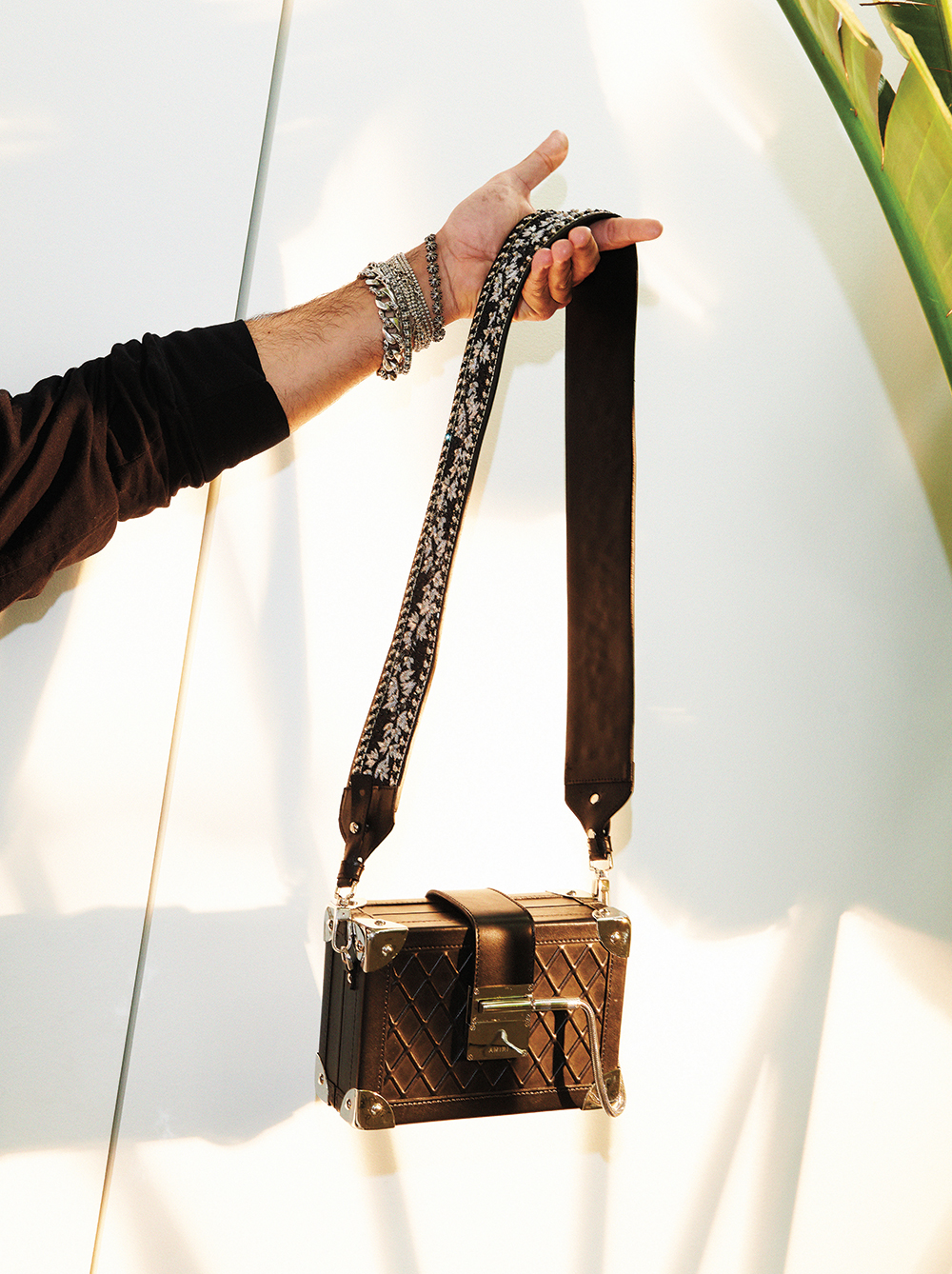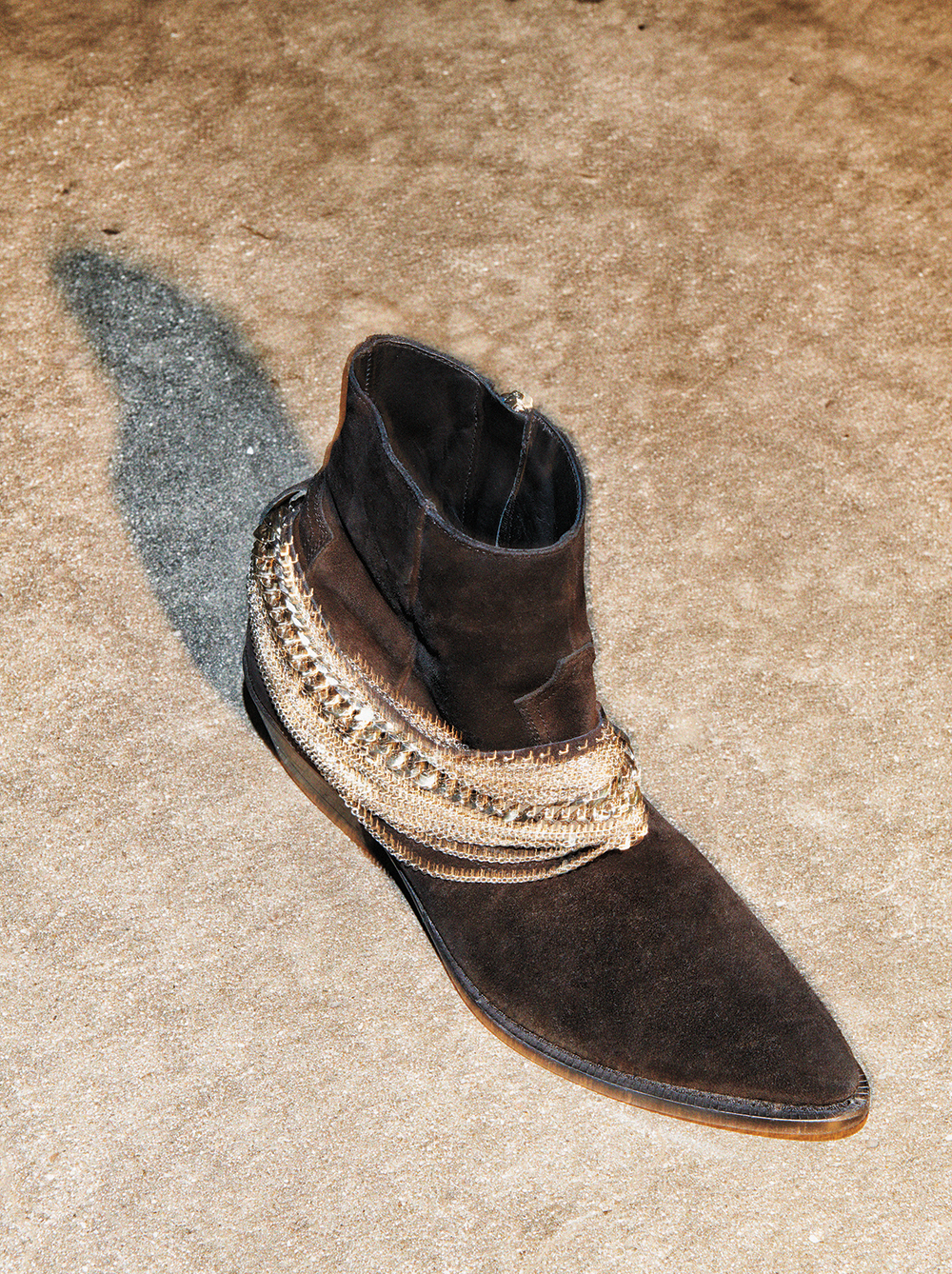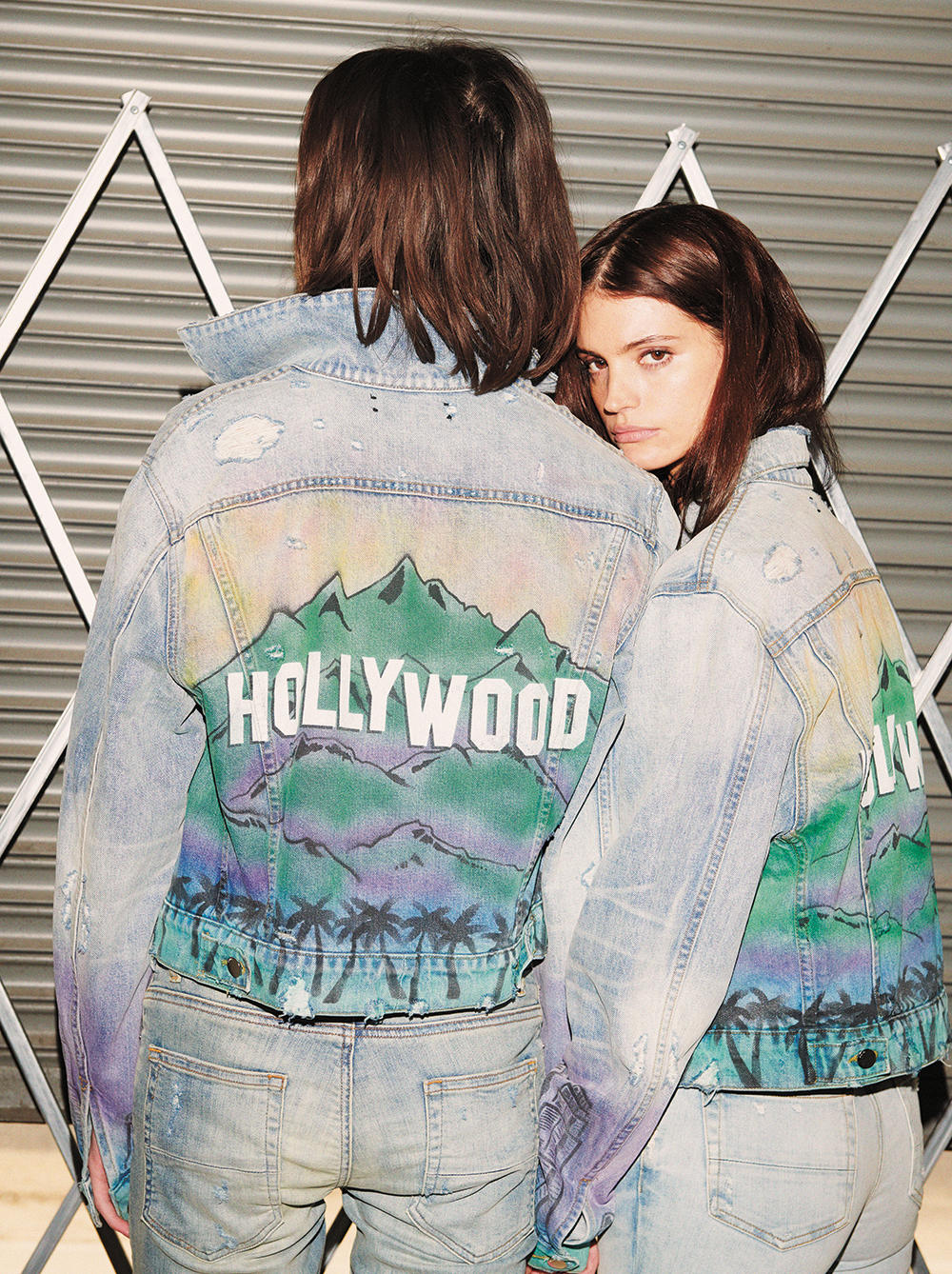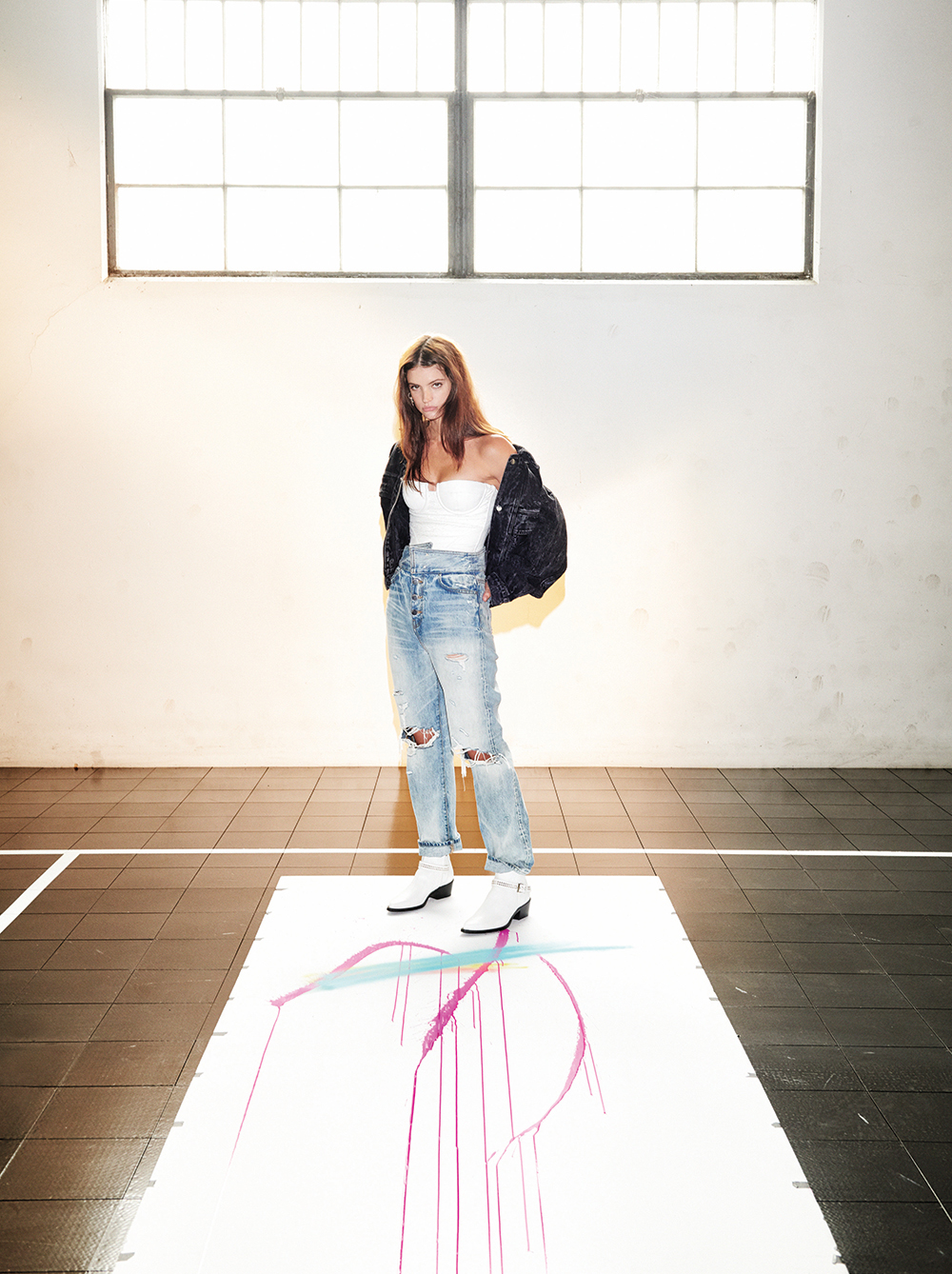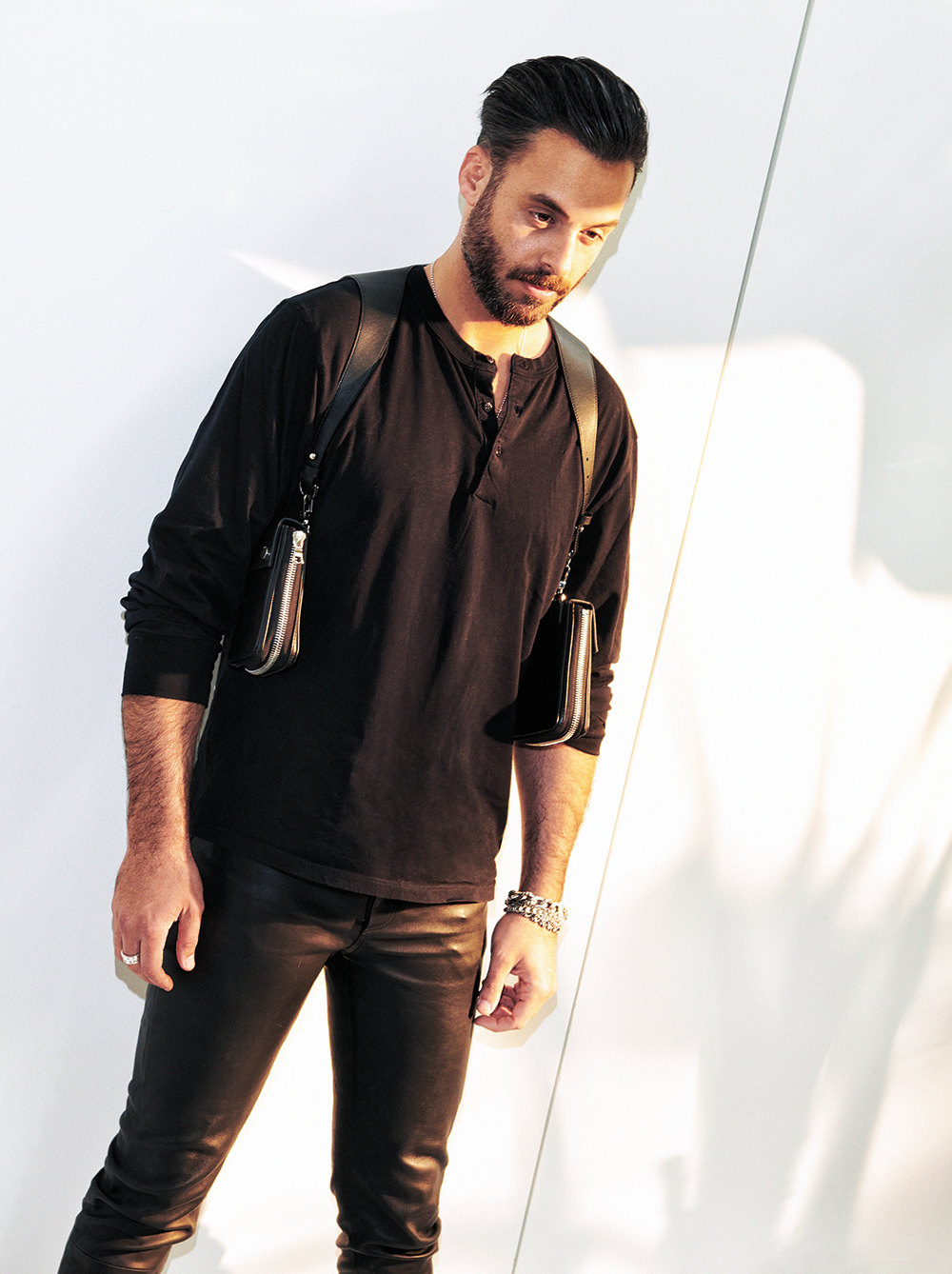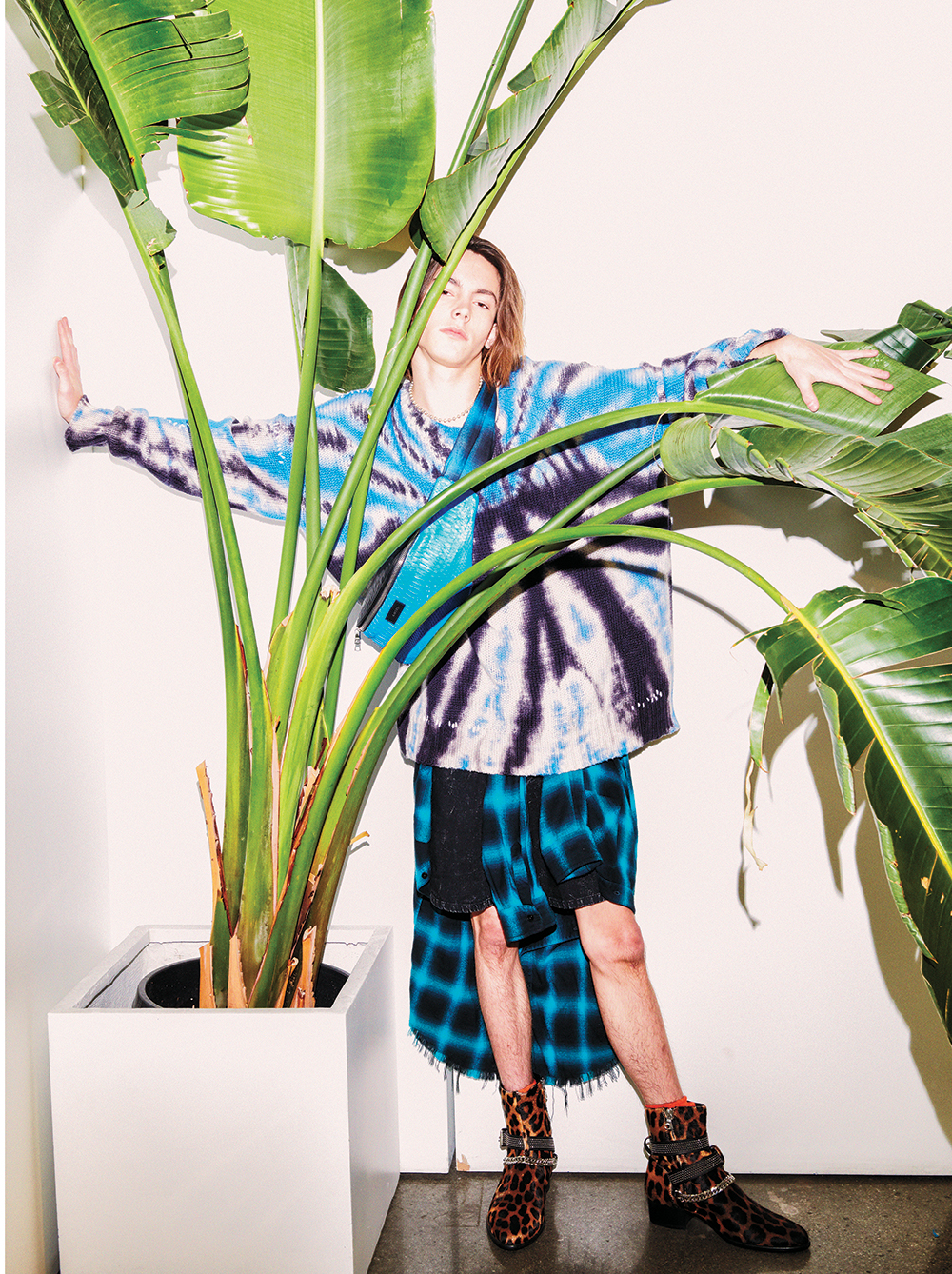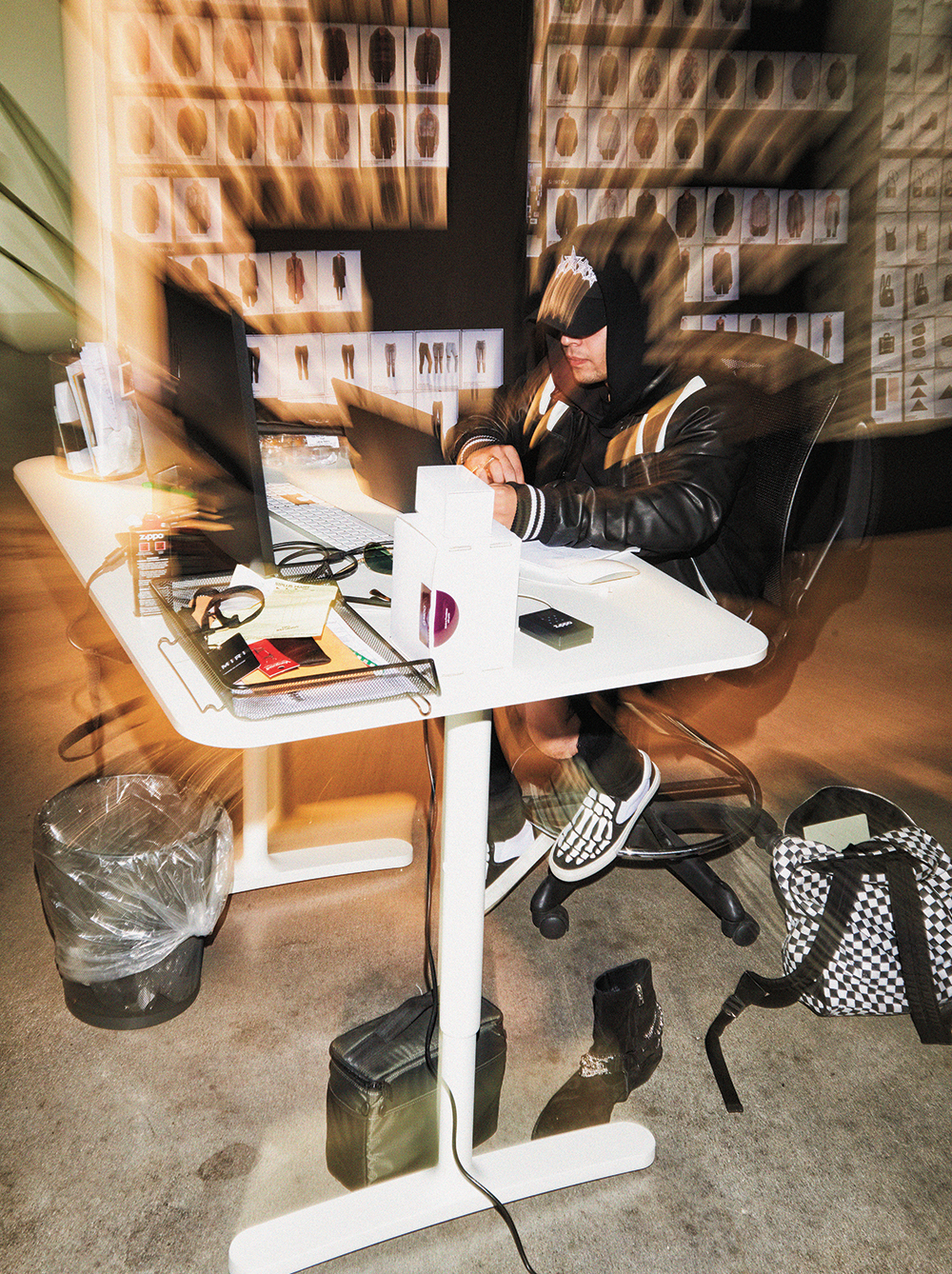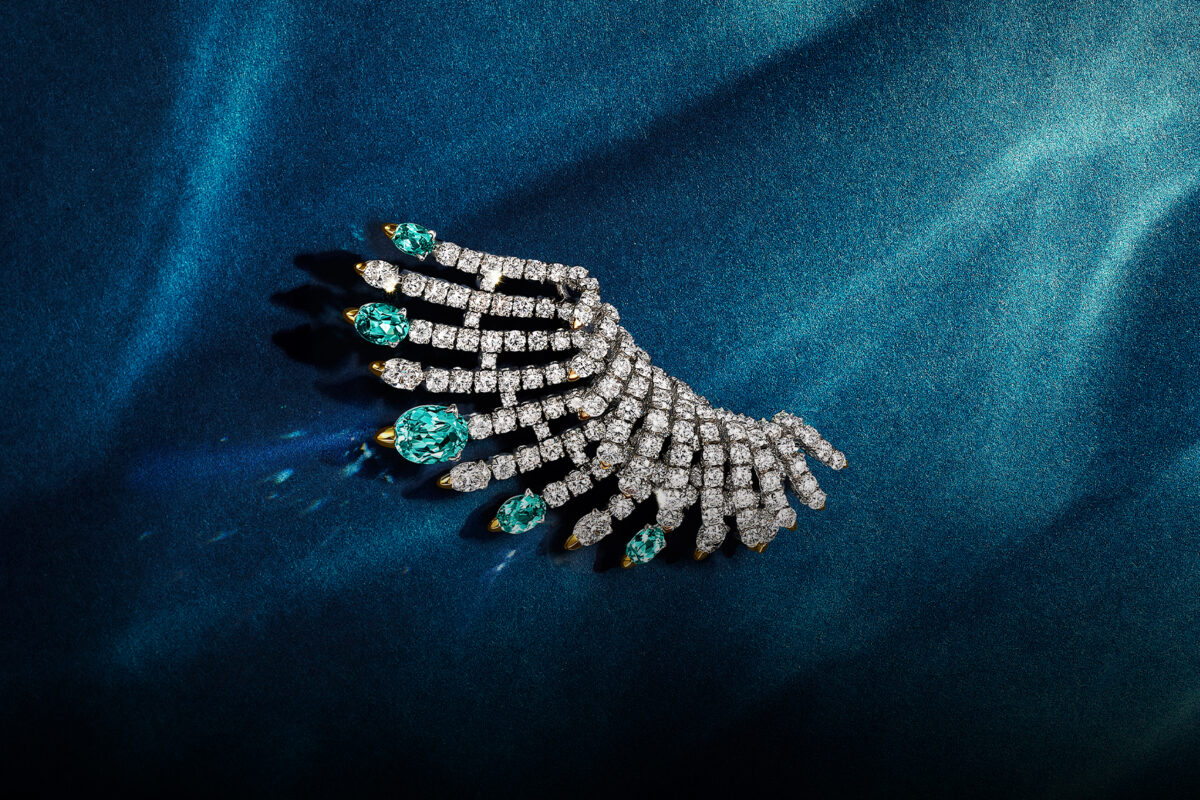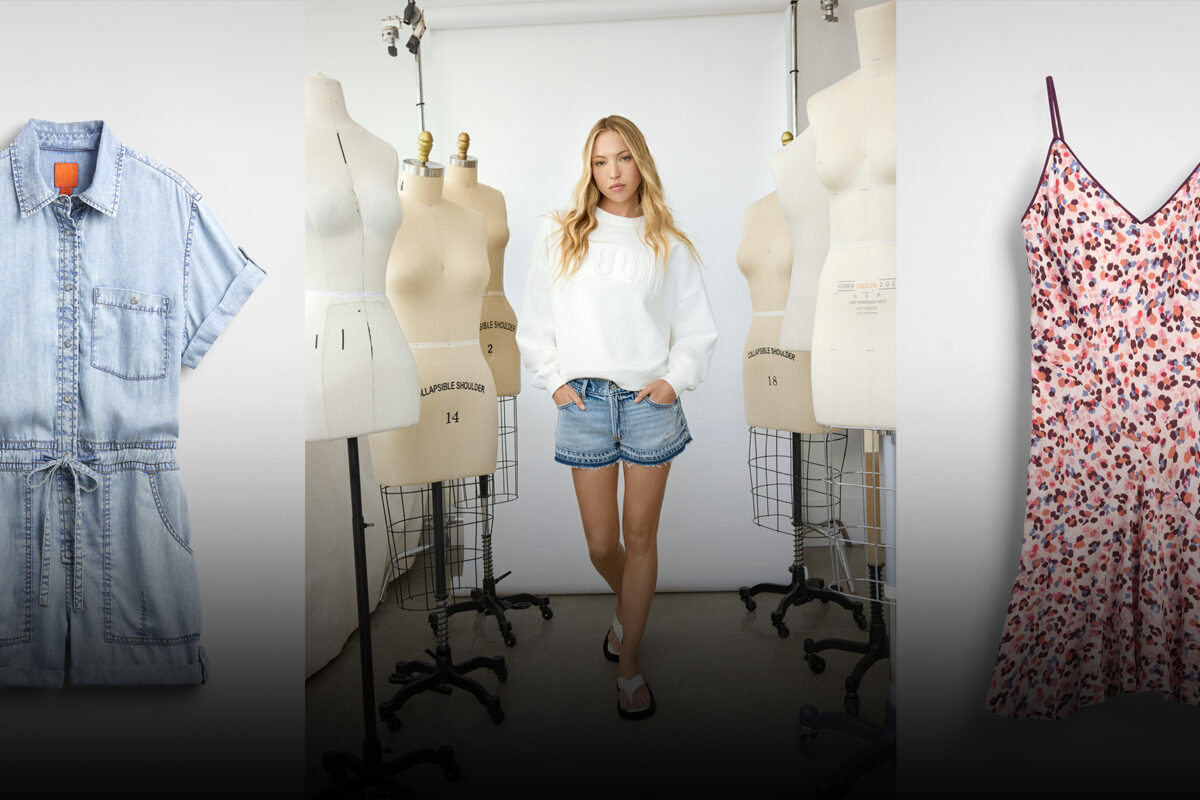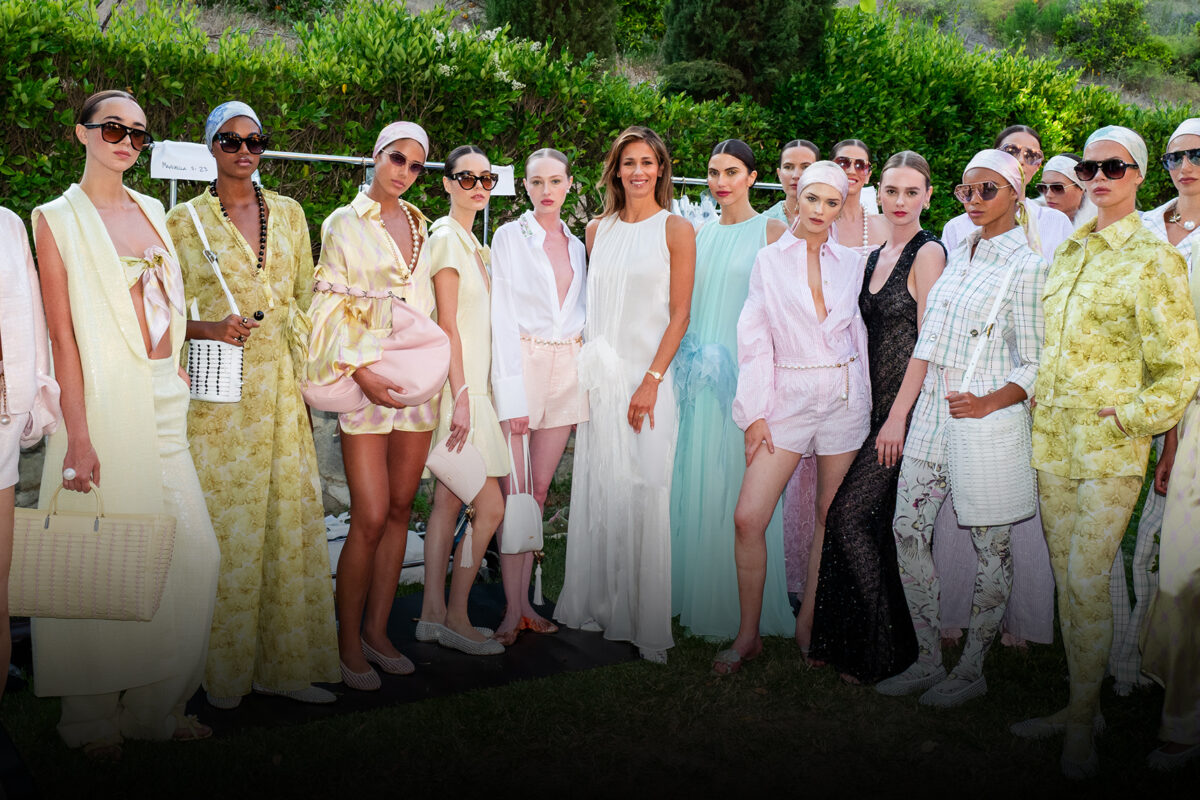In five years, Mike Amiri has grown his rock-inspired streetwear brand into California’s biggest luxury label
Words by DAVID HOCHMAN
Photography by FRANÇOIS DISCHINGER
Mike Amiri got his first fake ID at age 13. “I think I might have maybe convinced a guy in Hollywood to give it to me somehow,” the fashion designer behind Los Angeles’ most sought-after brand you might not yet have heard of says, wary even now to divulge his old tricks. Amiri’s parents, immigrants from Iran and highly motivated for success, had a home in the center of Hollywood but moved to an apartment in Beverly Hills so Mike could attend Beverly Hills High School. But it was the ID that was the entree to the grittier, glitterier side of the Strip.
These were the midnight glory days of The Roxy, Whiskey a Go Go, and a dimly lit, black-walled new club called The Viper Room. Inside, you might spot Slash from Guns N’ Roses hanging at a booth with Lenny Kravitz or Johnny Depp, and perhaps Amiri’s high school classmate Angelina Jolie taking a smoke break. But Amiri was just as satisfied soaking up the atmosphere from the curb.
Mike Amiri commissions a guy in the desert to “Clint Eastwood” his garments
“You’d see some guy waiting in line, wearing flannel around his waist over a T-shirt,” the 42-year-old says. “And his girlfriend looking super beautiful in leopard prints and a short skirt, and everybody looking completely carefree and cool, and it all kind of stuck with me, you know?” he says at his hangar-like studio in Downtown L.A.
The designer’s inspiration is not limited to his formative years in the ’90s. The Jim Morrison swagger, biker boots, grunge plaids, skater layers and ripped everything from L.A.’s Riot House era are to him what Coco Chanel might be to a Parisian fashion house. Only now his fantasia is bound by serious production demands, international fashion calendars and the perpetual stresses inherent to pulling off what no other independent luxury clothing brand from California has quite managed before — coming from seemingly out of nowhere to shine among the most buzzed about collections in the world.
AMIRI bag, $2,290, with strap, $695.
AMIRI boot, $1,690.
In less than five years, Amiri has gone from a one-man shop selling roughed-up denim and leather from the basement of a Hollywood Thai restaurant to blink-and-they’re-gone global stock lists at Barneys New York, Maxfield and beyond.
The company is projecting $100 million in sales within three years — without any flagship to speak of (brick-and-mortar stores are, however, on the cards). In 2016, it introduced womenswear, which represents 25 percent of the business.
“Amiri has become one of our top 20 brands globally,” says Fiona Firth, buying director for online retailer Mr Porter. “There is something truly authentic about both Mike Amiri and his brand. It’s special and relatable and inherits a lot of what’s so right about everyday ready-to-wear. It also transfers well to different spirits of style — rock ’n’ roll, hip-hop, an L.A. way of dress. There’s a practical magic there that a lot of men relate to.”
Amiri is a bit groggy today from his latest Paris show. The shearling jackets, cashmere coats and strappy clutches bedazzled with Tiffany-set Swarovski crystals launching later in 2019 pivot the brand away from Saint Laurent (to which it is often compared) in the direction of haute menswear stalwarts such as Berluti. Vogue Runway’s Luke Leitch dubbed Amiri’s outing “a contemporary fusion of ingredients you could pitch as Bruno Cucinelli-meets-John Varvatos by way of old-school Roberto Cavalli.”
Before Paris, Amiri was back and forth to Tuscany, trading on L.A. street sense for tailoring tips from the undisputed masters of the form. In this booming California fashion moment, which relies heavily on affordable luxury price points, Amiri is that rare standout pushing to deepen the skill set and truly elevate but on a global scale.
Jackson and Charlbi wear AMIRI denim jackets, $1,190 each, and jeans, $690 each.
“I lived in Florence for four months, going factory to factory for more than just inspiration … to really work,” he says. “I learned new ways of making things, and I was also showing them certain shortcuts on stitching and dying and airbrushing that they found fascinating. It was this combination of tight Italian hand-tailoring and pure L.A. recklessness, and who knows where that will lead us?”
No doubt it will be someplace visually arresting and good for a few zillion likes (interestingly, the Amiri brand has 174K Instagram followers of its slick product and campaign shots, while Mike’s personal account in which he posts snapshots of his celebrity friends has over 300K).
Charlbi wears AMIRI jacket, $990, corset, $950, jeans and boots, runway only, and JUNE NINETEEN earrings, $280.
The designer wears AMIRI bag, $792.
Jackson wears AMIRI sweater, runway only, shorts, $490, and crossbody bag, $2,190.
Amiri normally resides in the Valley with his wife and their three young children, which “forces me to stay normal and go to Saturday school basketball games and not constantly obsess over finishing various collections,” he says. But asked how he could improve as a husband and man-about-the-casa, Amiri laughs and says, “Do you have enough space on that recorder?”
We are in his upstairs thinking chamber at the 30,000-square-foot, white-on-white-on-shimmering-concrete complex that houses his fashion studio, design showroom, open-space offices and (mostly because he can) indoor basketball court. The office dress code appears to divide the staff: half look like rock stars, the rest like lab techs. (Amiri painstakingly sources the finest cashmere, denim and other fabrics from across the world before they are assembled in Los Angeles). On the industrial side, cutters and pattern makers in atelier coats oversee the finishing details of the collections that have drawn the attention of Amiri superfans like Future, Meek Mill, Michael B. Jordan, Courtney Love, Allen Iverson, Odell Beckham Jr., J. Balvin and Kirk Hammett.
Inside the brand’s hangar-like new headquarters, located in a former 1930s metals factory in Downtown Los Angeles.
I knew only a couple of details about Amiri the man before stepping inside his sleek dream factory: He wears great big hats pulled low over dark sunglasses, even inside. And he believes good cashmere just looks way cooler if you take it out to Joshua Tree and shoot holes through it with a shotgun. It came as a pleasant surprise then to find him neither hidden under a wide brim nor locked and loaded. Amiri still occasionally commissions a guy in the desert to “Clint Eastwood” his garments, but laying aside the hat and specs turns out to be part of an overall effort to be more comfortable with himself, more authentic, more vulnerable.
“As an outsider all my life and more of an observer, it gave me some small protection being in the shadows, being in the background, but I saw a couple years ago that a wall was standing between me and greater success,” he says. Without the Lizard King getup, it’s easy to appreciate that Amiri is quite handsome: tall with a neat beard, thick combed-back black hair and dark probing eyes. He’s clad in all black with black slim-fit jeans flecked with polished silvertone hardware. If this is “living the brand,” it’s a life exuding confidence and conspicuous craft.
The designer at work.
Age is making that easier. As the middle child with a rebellious older brother and younger brother taking all the attention, Amiri wore a sort of invisibility cloak growing up that let him frolic unseen — mostly. “I got arrested for graffiti in high school and spent a day at the Beverly Hills Police Department, which isn’t much different than the Beverly Hills Hotel,” he says. “I was more scared of my dad than anything else.” In high school, while other kids played sports, Amiri, a skater and BMXer, was scouring racks at vintage stores, “deconstructing blazers and reassembling motorcycle jackets,” as he puts it. He tried law, earning a degree from Loyola Law School; and for a few years, he gave the music business a go, songwriting, producing and performing with artists in Korea, where he is said to have co-founded the Korean hip-hop genre. But it was in the nearby Fashion District that he found his career calling. The luxe one-off jackets and suits he learned to rip, patch and embellish with stylists between torts classes ended up as stage and red-carpet pieces for artists like Usher and Aerosmith’s Steven Tyler. “My parents were not happy I didn’t practice law,” he says. “They are happy now that I employ tons of lawyers.”
So who is the elusive muse for the latest collection? “I don’t have a specific muse as much as I think about the most transparent version of me,” he says. “If I just stay in my lane and commit to the guy I am, that connects with people.”
That’s an identity you simply can’t fake.
Models: CHARLBI DEAN at Next Management and JACKSON OLLER at LA Models
Hair and makeup by MICHELLE MUNGCAL at The Visionaries Agency
Grooming by MICHELLE HARVEY at Opus Beauty using Chanel Les Beiges and R + Co.
Feature image: MIKE AMIRI (center) wears AMIRI pants, $2,990, boots, $1,390, shirt and jewelry, Amiri’s own (worn throughout). Model Charlbi Dean wears AMIRI blazer, $1,890, dress, $1,990, shirt, $650, and boots, runway only. JUNE NINETEEN necklace, $120. Model Jackson Oller wears AMIRI jacket, $2,990, shirt, $790, jeans, $850, and boots, $895. JUNE NINETEEN necklace, $930 (worn throughout).
This story originally appeared in the March 2019 issue of C Magazine.
Discover more STYLE news.

